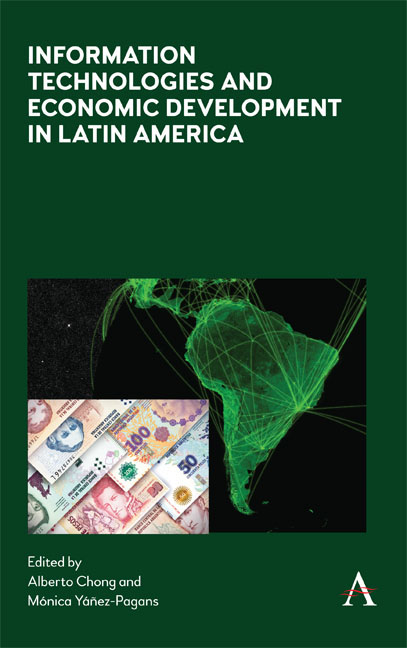Book contents
- Frontmatter
- Contents
- List of Illustrations
- List of Editors
- List of Contributors
- Acknowledgments
- Chapter 1 Information Technologies in Latin America
- Chapter 2 The Impact of ICT in Health Promotion: A Randomized Experiment with Diabetic Patients
- Chapter 3 The Impact of ICT on Adolescents’ Perceptions and Consumption of Substances: Evidence from a Randomized Trial in Uruguay
- Chapter 4 Text Messages as Social Policy Instrument: Evidence from a Randomized Controlled Trial with Internal Refugees in Colombia
- Chapter 5 Radio and Video as a Means for Financial Education in Rural Households in Peru
- Chapter 6 Digital Labor-Market Intermediation and Subjective Job Expectations
- Chapter 7 From Cow Sellers to Beef Exporters: The Impact of Traceability on Cattle Farmers
- Chapter 8 The Labor Market Return to ICT Skills: A Field Experiment
- Chapter 9 Soap Operas for Female Micro Entrepreneur Training
- Index
Chapter 8 - The Labor Market Return to ICT Skills: A Field Experiment
Published online by Cambridge University Press: 30 April 2020
- Frontmatter
- Contents
- List of Illustrations
- List of Editors
- List of Contributors
- Acknowledgments
- Chapter 1 Information Technologies in Latin America
- Chapter 2 The Impact of ICT in Health Promotion: A Randomized Experiment with Diabetic Patients
- Chapter 3 The Impact of ICT on Adolescents’ Perceptions and Consumption of Substances: Evidence from a Randomized Trial in Uruguay
- Chapter 4 Text Messages as Social Policy Instrument: Evidence from a Randomized Controlled Trial with Internal Refugees in Colombia
- Chapter 5 Radio and Video as a Means for Financial Education in Rural Households in Peru
- Chapter 6 Digital Labor-Market Intermediation and Subjective Job Expectations
- Chapter 7 From Cow Sellers to Beef Exporters: The Impact of Traceability on Cattle Farmers
- Chapter 8 The Labor Market Return to ICT Skills: A Field Experiment
- Chapter 9 Soap Operas for Female Micro Entrepreneur Training
- Index
Summary
Introduction
The labor market is characterized by search costs, mismatches and asymmetric information. In this context, the use of PCs and the Internet promise to improve and make more efficient worker-firm communications (Autor, 2001; Pissarides, 2000). Internet job search, which involves navigating the web, online job searching, filling forms, writing Word documents and attaching them to an e-mail, is indeed already commonplace. Still, no research examines how Information and Communication Technologies (ICT) skills of workers might play a role in their likelihood of employment. This chapter concentrates on the question of whether people with High ICT skills are more likely to be successful in this new ‘‘wired’’ labor market or not. Specifically, we design an experiment to study whether people with high knowledge of ICT skills (i.e., a line in their resume self-reporting an advanced level of knowledge of various software) are more likely to be contacted after submitting a resume, in the context of two middle-income Latin-American cities.
Our experimental design follows the empirical strategy utilized in the seminal works of Riach and Rich (2002), and Bertrand and Mullainathan (2004) to address the issue of not observing the full set of relevant variables determining individual's labor market productivity. The former study gives an overview of this type of field experiments, while the latter investigates potential discrimination of non-whites (against whites). Since then a host of other studies have been done each focusing on a dimension of discrimination: gender (Booth and Leigh, 2010), immigrants (Carlsson and Rooth, 2007), homosexuality (Ahmed et al., 2011) and beauty (Lopez Boo, Rossi and Urzua, 2010). The common element in these studies is that fake applications are send to real vacancies. These fake applications— within a group— are similar in all except one characteristic, which is the one being randomized. This is the characteristic that defines whether or not there is discrimination. The studies find that males, immigrants, homosexuals and plain looking applicants receive fewer callbacks than females, natives, heterosexuals and good-looking applicants. This is evidence that employers discriminate in the first step of the hiring process since all the characteristics associated with productivity are the same by design.
- Type
- Chapter
- Information
- Publisher: Anthem PressPrint publication year: 2020



